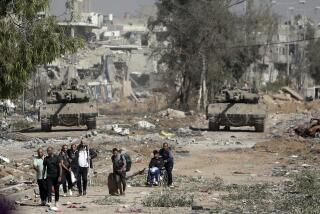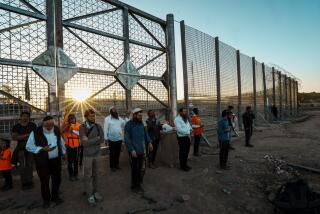Hamas sees opportunity in change in Egypt
Egypt’s revolution brought sudden and unintended freedom to Ayman Nofal.
During the chaos in Cairo, the senior Hamas commander broke out of an Egyptian jail with thousands of other prisoners, traversed the Sinai desert in a series of getaway cars, crawled through a smuggling tunnel at the border and emerged back home in the Gaza Strip to a hero’s welcome.
Now Nofal has one thing on his mind. “I’m anxious to get back to fighting Israel,” the 37-year-old Palestinian militant said in his Nuseirat refugee camp home, surrounded by several of his six children and a plastic flower bouquet.
The man accused by Egypt of plotting terrorist strikes against vacationing Israelis in the Sinai added, “I’m ready for the next battle.”
Ramifications of the leadership change in Egypt are pulsating through this impoverished seaside territory, raising new doubts about Israel’s 4-year-old strategy for containing Hamas, the Palestinian resistance group that has controlled Gaza since 2007.
Thanks to a controversial sea and land cordon imposed with former Egyptian President Hosni Mubarak’s help, and a 22-day military offensive two years ago that killed 1,400 Palestinians, Israeli officials were once confident that Hamas, which they label a terrorist group, had finally been beaten into submission, at least for the short term.
But with Mubarak out, Hamas leaders are quietly eyeing the prospect of a friendly government across their southern frontier, viewing it as their best chance yet to break a siege that has choked Gaza’s economy and entrapped its residents.
“Israel is the big loser in recent events,” senior Hamas leader Mahmoud Zahar said in an interview in his mint-green Gaza City home, rebuilt after Israel tried to assassinate him with a 2003 airstrike that killed his son. “This is a new era. They should fear.”
Under Mubarak, Egypt provided crucial support to Israel, sealing its border with Gaza for prolonged periods, constructing an underground barrier to block smuggling tunnels and arresting numerous Hamas leaders. Mubarak said he feared that Hamas, an offshoot of Egypt’s Muslim Brotherhood, would spread Islamist extremism into his nation.
With the Brotherhood, which had been officially outlawed in Egypt for decades, now a strong force in the nation’s politics, Hamas is hoping for warmer ties with Cairo, including an open border, free trade and formal diplomatic exchanges.
“This is our opportunity to have ordinary relations and break the siege,” Zahar said.
Even under Mubarak, Israelis complained that the Egyptian-Gazan border was like Swiss cheese, on account of the proliferation of arms-smuggling tunnels. They warn that Hamas is already exploiting the chaos to resupply with heavy guns and rockets through the Sinai peninsula. An open border would make the arms flow even worse.
“Mubarak agreed that Hamas needed to be tamed,” said Ilan Mizrahi, former head of Israel’s National Security Council. “I’m not sure the new regime will adopt the same policy…. That could open a gate for money, weapons and Iranian instructors.”
Nofal, the escaped Hamas fighter, said Israel’s capacity to impose its military will on Gaza has been weakened.
“Without Egypt’s backing, Israel could never start another war in Gaza like the past one,” he said.
Israeli army officials, eager to ensure that the landmark 1979 peace treaty with Egypt remains in force, declined to comment.
Though it remains unclear how Egypt’s next government will approach Gaza, the Egyptian military has promised to continue respecting its international peace treaties, including the one with Israel. Analysts say Israel could argue that joint anti-terrorist efforts along the border should be part of that agreement.
So far, Egypt’s military-led interim authority has left in place a temporary closure of the Gaza border, which was sealed for security reasons during the unrest. But Zahar said Hamas received hints that it would reopen this month.
Gazans counting on a warmer relationship with Egypt point to their cultural and religious kinship. An opinion poll last year found that about half of Egyptians supported Hamas.
On the other hand, Gaza militants are frequently blamed for using Egypt’s restive Sinai as a launching pad for their attacks. In recent weeks Hamas militias were suspected of bombing the natural gas pipeline to Jordan and Israel and firing upon Egyptian security outposts. Hamas denied involvement in both incidents. Hamas has also been accused of firing rockets from the Sinai into Israel.
Some expect Hamas to follow the lead of the Muslim Brotherhood in trying to present itself as more moderate and less threatening.
“They’re trying to lower their profile,” said Robert Pastor, a Carter Center senior advisor who meets frequently with Hamas leaders. “They don’t want to provoke additional fears.”
Zahar acknowledged that Hamas was taking a patient approach, not wanting to “embarrass” Egypt’s new government. He said Hamas is even keeping its distance from the Muslim Brotherhood, avoiding telephone contact because “we know the West is listening to every phone call and would try to abuse such information.”
For Hamas, it’s not all good news. Like other authoritative Arab governments, Hamas itself is vulnerable to public unrest. A new Facebook campaign, with several thousand followers, is encouraging Gazans to demonstrate against Palestinian leaders in Gaza and the West Bank, though so far protests have been small and easily broken up by authorities.
Five years after winning Palestinian elections, polls now show Hamas’ popularity waning as people bristle over attempts to silence dissent and impose stricter religious laws. Political opponents and journalists are frequently detained or attacked. The unemployment rate tops 45%, according to a United Nations report.
“Hamas acts as a kind of dictatorship, as another kind of occupation,” said Gaza activist Asmaa Alghoul, who said she was arrested and beaten with several other protesters as they attempted to demonstrate their support for Egypt’s revolution last month. Alghoul has clashed with Hamas authorities over her blog criticisms and defiant behavior. In 2009 she was arrested for “inappropriate laughter” as she walked with a group of friends on the beach, including some young men who were not her relatives.
“We need to free ourselves as human beings before we can free our land from occupation,” said Alghoul, 29, wearing a rust-colored vinyl jacket and no covering over her short, wavy hair. “Do you expect a woman whose husband beats her daily and takes her salary to then fight against occupation?”
A few miles away, in a dusty field of smuggling-tunnel holes along the Egyptian border, a supervisor known as Abu Mahmoud, 45, voiced one of the few complaints in Gaza about Egypt’s revolution.
He’s worried that if the border opens with Egypt, his smuggling operation will go out of business. Daily wages have dropped from $100 to $25 since Israel loosened its ban on food items, clothing, motorbikes and household appliances.
These days the best profits are earned on construction materials such as gravel, which he hoists up from a 50-foot-deep hole in old flour sacks with a motorized pulley.
“If the border opens, I guess I’ll have no choice but to go home,” Abu Mahmoud said, unhitching another load. “But I don’t know what I’ll do then.”
More to Read
Start your day right
Sign up for Essential California for news, features and recommendations from the L.A. Times and beyond in your inbox six days a week.
You may occasionally receive promotional content from the Los Angeles Times.






